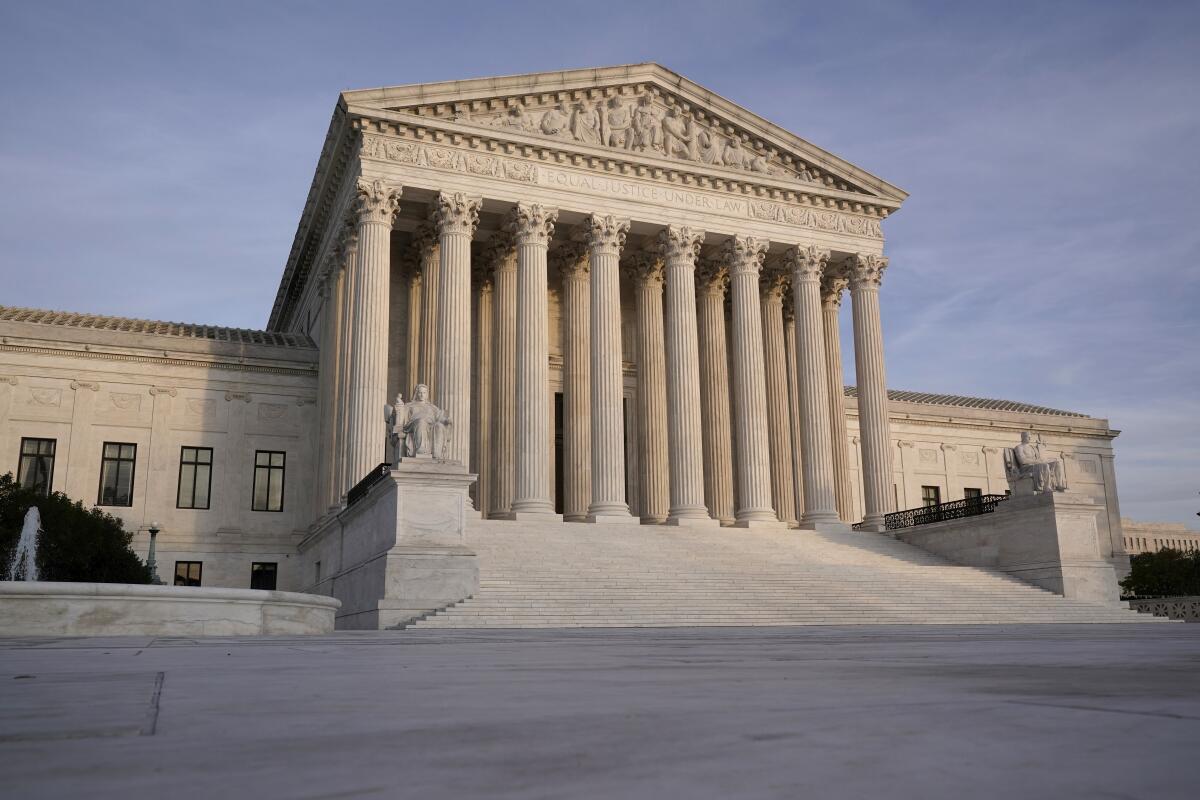Op-Ed: The Supreme Court’s vaccine mandate ruling is the start of something far worse

- Share via
The Supreme Court’s recent decision to block the Biden administration’s vaccination-or-test requirement for large private businesses will threaten the safety of hundreds of thousands of workers. But the damage it could do goes well beyond the pandemic.
The court’s 6-3 majority acknowledged that the order would save more than 6,500 lives and prevent more than 250,000 hospitalizations — but went ahead and blocked it anyway. There is probably no other court in the world that would stop its national government from taking such common-sense emergency measures to protect workers from the life-threatening risks of COVID. On Friday, a federal judge, relying on the Supreme Court’s decision, went still further, ruling that the president could not even require the federal government’s own employees to be vaccinated, despite a statute giving him broad authority to regulate employment policy for all federal workers.
Even more worrisome, though, is what the court’s reasoning means for our ability to address national challenges going forward. The majority stopped the order based on a wildly anachronistic vision of how the federal government should operate — one that would require Congress itself, rather than federal agencies, to micromanage complex problems.
That view would render the federal government incapable of addressing many of the nation’s biggest challenges — including public health, the economy and climate change. At a time when Congress is hopelessly gridlocked, the conservative majority’s framework is a recipe for disaster.
Under long-established legal principles, Congress can authorize a federal agency to set and enforce broad rules and regulations. The Biden administration’s vaccine-or-test order falls fully within this authority. In 1970, Congress specifically empowered the Occupational Safety and Health Administration to adopt emergency measures to protect workers where they face “grave danger from exposure to substances or agents determined to be toxic or physically harmful.”
That’s exactly what OSHA did. COVID is a “physically harmful” “agent” that poses “grave danger” to employees in the workplace, and emergency action was necessary to protect them from that exposure. For the conservative justices, who claim to be bound by the literal terms of statutes, this should have been the end of the story.
But no. They jettisoned their commitment to textualism, and instead, came up with a way to throw the text aside. They maintained that when Congress authorizes an agency “to exercise powers of vast economic and political significance,” it must “speak clearly.” And then they reasoned that because Congress directed OSHA to address “occupational” safety — and COVID presents dangers outside as well as inside the workplace — OSHA’s authority was insufficiently clear. But nothing in the law limits OSHA to addressing only dangers that arise exclusively in the workplace, and it has long regulated dangers that arise at work and outside work, such as fire and dust.
Justice Neil M. Gorsuch, in a concurring opinion joined by Clarence Thomas and Samuel A. Alito Jr., tied the majority’s approach to the long dormant “nondelegation doctrine,” which says that Congress cannot delegate its powers to another branch of government. The upshot is to require Congress itself to act rather than allowing the executive branch, through its departments and agencies, to do so wherever the justices deem an issue “major,” a term the court has never defined.
Congress cannot possibly legislate all the regulations that it takes to govern the nation — even if it weren’t mired in partisan gridlock. Many subjects require expertise and fact-finding that must, for all practical purposes, be done by federal agencies. Everything the Federal Reserve Board does has “vast economic and political significance,” but surely that doesn’t mean Congress has to set interest rates.
Congress routinely empowers agencies, like OSHA, the Environmental Protection Agency and the Federal Communications Commission, to govern broad areas, like workplace safety, the environment and the airwaves.
And the Supreme Court has long blessed those arrangements; it has only ever invalidated two administrative rules under the “nondelegation doctrine” — and both of those cases were in 1935. For example, in 1944, the court upheld the FCC’s very broad governing statute, which authorizes the agency to regulate the airwaves “as public interest, convenience, or necessity” require.
Countless areas of the modern economy are regulated and governed by federal agencies; that’s their job. Yet the decision to block the OSHA vaccine-or-test requirement is an initial salvo in what could become a full-scale attack on the administrative state.
Next month, the court will hear argument in West Virginia vs. EPA, a case challenging the EPA’s authority to impose “clean power” emissions standards on electrical power plants. Echoing the court’s majority in the OSHA decision, the challengers argue that Congress did not speak clearly enough, even though it expressly directed the agency to establish “the best system of emission reduction” in this setting.
If the court applies the reasoning of the OSHA case to this case as well, it will have dismantled the longstanding framework of national governance, even as we desperately need to respond effectively to the two greatest threats we face — the pandemic and climate change.
David Cole is national legal director of the ACLU and a law professor at Georgetown University.
More to Read
A cure for the common opinion
Get thought-provoking perspectives with our weekly newsletter.
You may occasionally receive promotional content from the Los Angeles Times.










